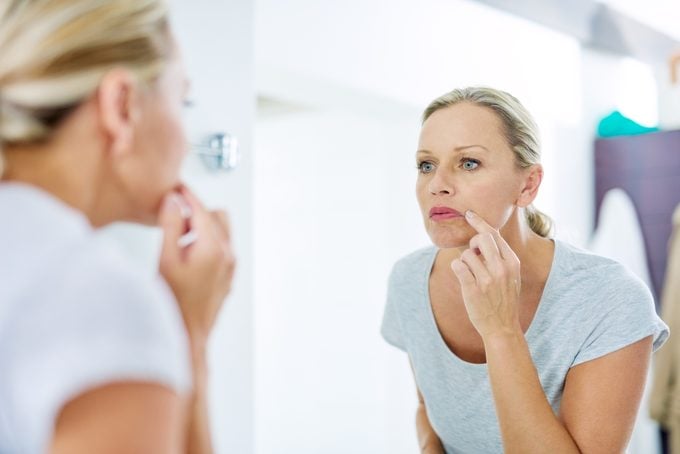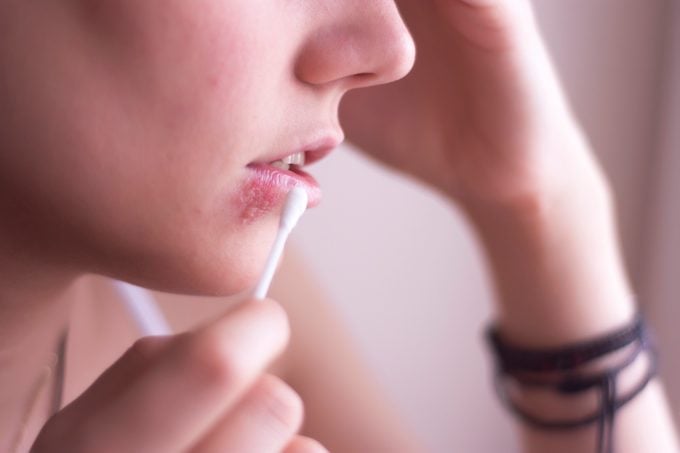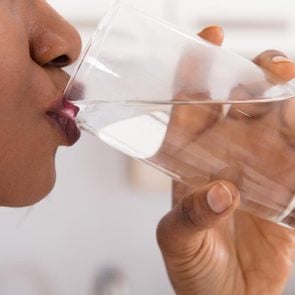Have a Cold Sore? What to Know About Symptoms, Treatments, and Prevention
Updated: May 12, 2021
Cold sores are the worst. There is no cure for these fluid-filled blisters that show up on the lips, but there are things you can do to prevent outbreaks and shorten the duration when they do occur.
Our editors and experts handpick every product we feature. We may earn a commission from your purchases.
On This Page
What are cold sores?
Cold sores, also known as fever blisters, can appear on your mouth or lip and are usually caused by oral herpes or herpes simplex virus type 1 (HSV-1). “It’s extremely ubiquitous,” says Alexandra Golant, MD, program director, dermatology residency, and assistant professor of dermatology at the Icahn School of Medicine at Mount Sinai in New York City.
As many as 80 percent of American adults are infected with oral herpes, the virus that causes cold sores or fever blisters, which typically appear on or around the mouth. Other names for the cold sore virus are oral herpes, mouth herpes, and herpes simplex labialis.
The virus resides live in a cluster of nerve cells on the side of your face called the trigeminal ganglion. When the virus travels along the nerves to your lips, you may develop a tell-tale cold sore. The virus lives in the trigeminal ganglion for the rest of your life, occasionally re-activating to cause the painful and annoying blisters once again.

Cold sore symptoms
Not everyone with an HSV-1 infection will develop symptoms. The HSV-1 virus typically causes tiny, clear, fluid-filled blisters, typically on just one side of the lips. The blisters may spread to the surrounding skin or into the mouth.
While HSV-1 can also cause genital herpes, most cases of genital herpes are caused by a different form of herpes simplex called HSV-2. “We are seeing more genital HSV-1 cases due to changing sexual practices among young people,” she says. “You can transmit HSV-1 just as easily to the genitalia during oral sex.”
Your first cold sore virus outbreak is usually the worst and often travels with fever, swollen lymph nodes, and overall just not feeling well, adds Delray Beach, Florida-based dermatologist John Strasswimmer, MD PhD, a clinical professor of dermatology at Florida Atlantic University in Boca Raton. This is because your body doesn’t have any antibodies against the virus yet.
Most people develop one or two cold sores per year, but as many as 10 percent may develop more than five per year. Before a cold sore appears, you’ll likely feel a tingling or itching sensation in the area. This is known as a prodrome. Cold sores can be painful and can last weeks without treatment. The blisters may break open when you talk, laugh, or chew and can ooze fluid. The blister eventually crusts over and scabs, and the scabs can also crack and bleed.
The virus is most contagious during the period when it’s known to be “shedding.” This begins with the tingling and prickliness of the prodrome and usually ends when the sore has scabbed. “Once the lesion has scabbed over and you don’t see active blistering, you are reliably in the clear,” Dr. Golant says. Still, “err on the side of caution and wait a week to avoid contact before letting your guard down.”
The virus is spread by skin-to-skin contact such as kissing and sharing straws, cups, or beverages. Don’t share towels, dishes, and cutlery when you are in the contagious stage. It’s also important to avoid sports that involve physical contact. Trauma to the area can cause the blister to break open. Engaging in oral sex is also not advised as the virus can spread from your lips to your partner’s genitals. Always wash your hands if you touch your lips with them.
Cold sore causes
Cold sores are caused by infection with the highly contagious HSV-1 virus. Most people are infected when they are kids. HSV-1 is especially dangerous for newborns, and can even cause potentially life-threatening infections. This is why you should not let anyone kiss your baby, and everyone should wash their hands before holding a newborn.
Most people do not know when they were exposed, adds Dr. Golant. Once you are infected, the virus stays in the body. If it reactivates, you may get cold sores again and again.
Cold sore diagnosis
Most of the time your dermatologist can diagnose a cold sore based on where it is on your lips and what it looks like. “Its classic location is on the border of your lip, which helps distinguish it from canker sores and other lip lesions,” says Dr. Golant.
Some people may want a more official diagnosis, she says. “When we are seeing patients in an acute outbreak with an active blister, we can do a swab test and send it off to the lab to identify the presence of HSV.”
Cold sore triggers
The virus lives inside your body and doesn’t cause problems until your immune system is stressed, Dr. Strasswimmer adds. When this happens, an outbreak can occur. “Anything that affects your immune system, in general, can cause an outbreak,” he says. This includes when you’re stressed or not sleeping well, he says.
Other triggers include sunlight and trauma to the area, he notes. “If you are having a cosmetic or surgical procedure around your mouth, the reaction to the treatment and stress on the skin may wake up the virus and cause cold sores.”
Strong winds on your face can also bring on a cold sore.

Cold sore treatments
There is no cure for the cold sore virus. Once the blistering has started, it’s going to run its course and heal over, but there are things you can do to minimize any pain and potentially shorten the duration of the outbreak, Dr. Strasswimmer says.
“It will heal faster if you keep it covered with an ointment like Aquaphor,” he says.
Icing the area with a cold compress can help relieve pain. “Ice it for 15 minutes and then take it off, as leaving the ice on the cold sore for too long can cause frostbite and make it worse.”
Topical painkillers also can help. Look for benzocaine, lidocaine, dibucaine, or benzyl alcohol on the product labels. Over-the-counter painkillers such as ibuprofen also may help reduce the pain and inflammation associated with cold sores, Dr. Golant says.
Antiviral creams such as over-the-counter Abreva (docosanol cream) or prescription acyclovir cream may shorten the duration of the outbreak if you begin using them at the first sign of an outbreak, says Dr. Golant. Medications are then applied to the affected area every 2 to 3 hours, over a period of five days.
Antiviral medications such as acyclovir, valacyclovir, or famciclovir also can be taken by mouth to shorten the length of the outbreak, she adds.
It’s not just what you do, but what you don’t do that can help ease cold sore pain. Acidic foods and drinks like juice or vinegar can irritate the wound if your blister is open, so it’s a good idea to avoid these items.
Cold sore prevention
If you are susceptible to cold sores, take extra precaution in the sun especially when you are skiing or spending a day at the beach, says Dr. Strasswimmer.
If you get multiple outbreaks per year, your dermatologist may suggest taking antiviral medication daily to prevent outbreaks.
“You may also be a candidate for a ready-to-go prescription from your dermatologist for antiviral medication, so you can start as soon as the symptoms first appear during the prodrome period,” Dr. Strasswimmer says.
When to see a doctor
Most cold sores will run their course and disappear, but if you get one on the tip of your nose, see a doctor right away, Dr. Strasswimmer says.
“If it’s on the tip of your nose, it could also be in the back of your eyeball,” he explains. “The virus lives in nerves and the nerves on the tippy tip of your nose have a branch that goes to the back of the eyeball,” he says. Cold sores in the back of your eye can result in blindness if not treated.
If you have an underlying condition that affects your immune system, such as HIV or cancer, or if you take medication that lowers immune response, such as chemotherapy to treat cancers, you may be prone to multiple outbreaks.
“We see an uptick of outbreaks in pregnant women too,” Dr. Galant says. Check in with your dermatologist to make sure you are doing all you can to keep the number of outbreaks low, she says. If you have the inflammatory skin condition eczema or severe burns, the virus may infect larger areas of your skin. Fortunately, this does not occur often.
Helpful products for cold sore relief
While there is no cure for oral herpes, there are many products that can help limit the course of an outbreak, relieve any pain associated with the cold sore, and possibly prevent future cold sores. Keeping ice packs on hand can help with pain, and it’s essential to protect your lips from the sun’s harmful rays with a broad-spectrum sunscreen if you are prone to cold sores.
Here are some products that may help provide you with some much needed cold sore relief.
Additional resources
If you need additional help and information for cold sores, check out a few of these resources:





















